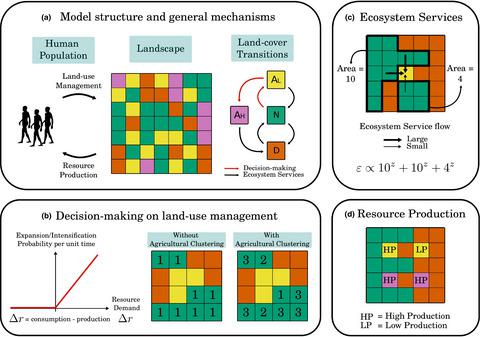当前位置:
X-MOL 学术
›
Ecol. Lett.
›
论文详情
Our official English website, www.x-mol.net, welcomes your feedback! (Note: you will need to create a separate account there.)
Habitat percolation transition undermines sustainability in social-ecological agricultural systems
Ecology Letters ( IF 8.8 ) Pub Date : 2021-11-07 , DOI: 10.1111/ele.13914 Diego Bengochea Paz 1 , Kirsten Henderson 1 , Michel Loreau 1
Ecology Letters ( IF 8.8 ) Pub Date : 2021-11-07 , DOI: 10.1111/ele.13914 Diego Bengochea Paz 1 , Kirsten Henderson 1 , Michel Loreau 1
Affiliation

|
Steady increases in human population size and resource consumption are driving rampant agricultural expansion and intensification. Habitat loss caused by agriculture puts the integrity of ecosystems at risk and threatens the persistence of human societies that rely on ecosystem services. We develop a spatially explicit model describing the coupled dynamics of an agricultural landscape and human population size to assess the effect of different land-use management strategies, defined by agricultural clustering and intensification, on the sustainability of the social-ecological system. We show how agricultural expansion can cause natural habitats to undergo a percolation transition leading to abrupt habitat fragmentation that feedbacks on human's decision making, aggravating landscape degradation. We found that agricultural intensification to spare land from conversion is a successful strategy only in highly natural landscapes, and that clustering agricultural land is the most effective measure to preserve large connected natural fragments, prevent severe fragmentation and thus, enhance sustainability.
中文翻译:

栖息地渗透转变破坏了社会生态农业系统的可持续性
人口规模和资源消耗的稳步增长正在推动农业扩张和集约化。农业造成的栖息地丧失使生态系统的完整性面临风险,并威胁到依赖生态系统服务的人类社会的持久性。我们开发了一个空间明确的模型,描述了农业景观和人口规模的耦合动态,以评估由农业集群和集约化定义的不同土地利用管理策略对社会生态系统可持续性的影响。我们展示了农业扩张如何导致自然栖息地经历渗透转变,导致栖息地突然破碎,反馈人类的决策,加剧景观退化。
更新日期:2021-12-10
中文翻译:

栖息地渗透转变破坏了社会生态农业系统的可持续性
人口规模和资源消耗的稳步增长正在推动农业扩张和集约化。农业造成的栖息地丧失使生态系统的完整性面临风险,并威胁到依赖生态系统服务的人类社会的持久性。我们开发了一个空间明确的模型,描述了农业景观和人口规模的耦合动态,以评估由农业集群和集约化定义的不同土地利用管理策略对社会生态系统可持续性的影响。我们展示了农业扩张如何导致自然栖息地经历渗透转变,导致栖息地突然破碎,反馈人类的决策,加剧景观退化。



























 京公网安备 11010802027423号
京公网安备 11010802027423号